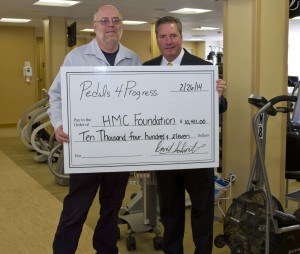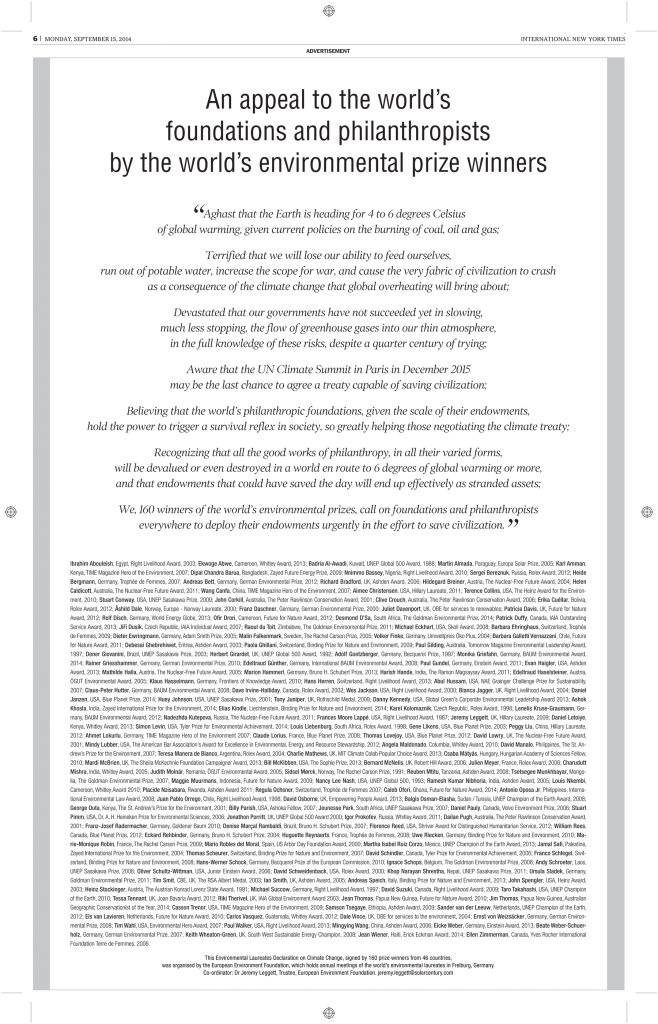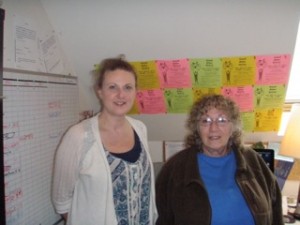Category Archives: Uncategorized
A New Face and a Fond Farewell
P4P’s long time office manager Beverly Merchant will be retiring around the end of the month. Beverly has been the linchpin at the center of the organization keeping track of all the loose ends. We certainly wish her a healthy and happy retirement with a sincere thank you for all of the work she has done on behalf of the organization. And even though we will miss Bev, this opens a door for someone else to take her place. I would like to introduce all of you to Lori – lori@p4p.org. Lori has big boots to fill but I am quite confident that given a little time she will do great as our new Office Manager. All of you Autumn bicycle collectors, this is a great chance to call up to say hello to Lori, last change to say goodbye to Bev, and a wonderful time to schedule your Autumn collection.
Dave
Donation to Hunterdon Medical Center
 Pedals for Progress, a local non-profit that helps to send used bicycles to developing countries, donated over $10,000 to the Hunterdon Medical Center Foundation. The funds will be designated for the cardiopulmonary rehabilitation program at Hunterdon Medical Center. The cardiopulmonary rehabilitation program recently moved to a larger renovated space at the hospital.
Pedals for Progress, a local non-profit that helps to send used bicycles to developing countries, donated over $10,000 to the Hunterdon Medical Center Foundation. The funds will be designated for the cardiopulmonary rehabilitation program at Hunterdon Medical Center. The cardiopulmonary rehabilitation program recently moved to a larger renovated space at the hospital.
The Great 100 Charity Ride
The Great 100 Charity Ride has three mileage options of 38, 62, and 100 miles. The ride is fully supported, including designated Rest Stops.
-
Sunday, September 8, 2013
6:30 AM to
-
1333 S. Prospect St., Nanticoke, PA (map)
Ride the challenging 38 Mile Option, the 62 Mile Option (Metric Century), or the full 100 Mile Option (Full Century).
This year’s ride benefits Pedals for Progress.
https://www.p4p.org
Start / Finish @ Luzerne County Community College
1333 South Prospect Street Nanticoke, PA 18634
Minimum Suggested Donation: $25.
Registration Opens @ 6:30am
Ride Starts @ 8:00am
——————————————————————
Ride Maps, Cue Sheets, GPS Downloads here:
38 Mile Option
http://ridewithgps.com/routes/2939423
or http://www.mapmyride.com/routes/view/254048019
——————————————————————
62 Mile Option
http://ridewithgps.com/routes/1414795
or http://www.mapmyride.com/routes/view/126295185
——————————————————————
100 Mile Option
http://ridewithgps.com/routes/1414777
or http://www.mapmyride.com/routes/view/126296947
——————————————————————
http://www.meetup.com/UpstateVelo/events/130805082/
A Loss in the P4P Family – Floyd Merchant
Please join us in sending our sympathies to Beverly Merchant due to her recent loss.
In lieu of flowers, memorials to:
ASPCA
PO Box 96929
Washington, DC
20090-6929
Freedom House
3 Pavillion Road
Glen Gardner, NJ
08826.
Floyd S. Merchant

Floyd S. Merchant, age 80, of Clinton, NJ passed away on Wednesday, June 19, 2013 at home after a long illness.
He was born on December 3, 1932 in Woodcliff Lake, NJ. He lived in Clinton, NJ for 32 years, moving from Pattenburg, NJ.
He was the son of the late Floyd S. and Marion Lunan Merchant.
He was the husband of Beverly Blumberg Merchant, celebrating 32 years of marriage.
He was a retired Sargent 1st Class in the US Army. He served in the US Air Force, completing 2 hitches in the Air Force and was also in the National Guard. He retired from the Army Reserve as a SFC.
Mr. Merchant graduated with 2 Bachelor’s Degrees; one from Ricker College in mathematics and one from Edison College in psychology. At age 70, he completed his Master’s Degree in Neuropsychology from Saybrook University in San Francisco, CA.
He operated his own alarm installation service “Hunterdon Security”, installing security alarms in the Hunterdon County area. Floyd was also an Electrical and Mechanical Engineer at Bell Labs in Whippany, NJ. In the last 15 years, he worked as a security guard at Foster Wheeler in Perryville, NJ.
Survivors in addition to his wife include 2 sons; Daniel White and his wife Retha of Missouri and Arthur H. Merchant of Basking Ridge, NJ. 1 daughter; Susan Walsh. 1 step-son; Kenneth Stern and his wife Sandra of Sandy Hook, VA. 4 grandchildren; David Walsh, John White, Samantha Stern and Cassidy Stern.
Calling hours will be Tuesday, June 25, 2013 from 2-4 and 7-9pm. Funeral Service will be Wednesday, June 26, 2013 at 10am. All at Scarponi-Bright Funeral Home, 26 Main Street, Lebanon, NJ. Interment will be private.
In lieu of flowers, memorials to ASPCA, PO Box 96929, Washington, DC, 20090-6929 or Freedom House, 3 Pavillion Road, Glen Gardner, NJ 08826.
test mailing list form
1st European Convention of Environmental Laureates
For many decades, on the wall next to my computer, there has been an AT&T poster with a photograph of the moon in the night sky and a very large Saturn, Jupiter and a third planet, maybe Pluto, in the background. In white letters in the night sky the poster reads “Don’t recycle. We can always move.” That seems to be the motto for many nations. Just shift the burden to another location or leave the poisoned one behind. I’ve never agreed with this mentality and, through P4P, have made a point to cross international boundaries not with pollution, but with productive recycled materials. We don’t need to make more, we need to use what we have—and share it.
I have been fortunate to earn recognition for my efforts and now, by virtue of having become a Rolex Laureate in 2000, I have been invited to participate in the 1st International Convention of Environmental Laureates in Freiburg Germany in March, 2012.
The Convention is an academic platform for those who have earned various prestigious prizes for marked accomplishments on behalf of the environment in Europe and other international locations. The goal of this convention is to push “for the development and adoption of ‘The Declaration on Rio +20 by International Convention of Environmental Laureates,’ which aims to send a positive signal for achieving ambitious climate and sustainability goals and necessary innovations.”
I’m already packing my bags, suit and all, and while I’m humbled by the recognition, I plan on grabbing this opportunity to push for the very real and necessary changes to international environmental standards and cooperation. After all, how useful are bicycles on the moon?
For more information on the convention and the European Environment Foundation go to or click on the following link: www.european-environment-foundation.eu
Richard E. ‘Dick’ Swisher
Yesterday the world lost a Hero.
We here at P4P need to acknowledge the passing of our dear friend and coworker Dick Swisher.
While the sewing machine program was a P4P initiative, it was Dick Swisher who made it successful. In the eleven years we have been shipping sewing machines, it was Dick who collected, repaired and prepared close to one thousand sewing machines for shipment overseas. Dick’s work with P4P touched lives of ordinary people from Albania to Yemen, sixteen countries in total.
He was a humble man from Granite Station Road in Gettysburg, Pennsylvania, who reached out to help the unfortunate worldwide. We lost a hero, a friend, someone totally irreplaceable. We need to celebrate his lifetime of accomplishments while we mourn his loss.
High Bridge man lifts thousands out of poverty
By DEB DAWSON, Editor, Recorder Community Newspapers
Posted: Thursday, February 10, 2011
HIGH BRIDGE, New Jersey – David Schweidenback, 58, is a man who really loves his job. He doesn’t just love it — Pedals for Progress (P4P) is his 20-year-old baby. He nurtures it daily, and is proud of its accomplishments.
The nonprofit organization he launched in the Feb. 11, 1991, edition of the Hunterdon Review has come a long way since then.
To date, it has helped to bring 130,000 people out of poverty by providing them with the means to get to a job, or even create one, using bicycles.
“I had a really good idea one day, and I acted upon it. And, rather than control it, I distributed it. Gave everybody else my idea, so they could go out and do what needs to be done,” said Schweidenback.
So now, in addition to Pedals for Progress, there are 70 similar organizations in 15 countries that do what he does – collect bicycles, some in need of minor repairs, fix them, and ship them to developing countries to be sold to folks who really want to make a buck, but have no way to do it.
Those organizations account for another 130,000 bikes – 260,000 in all.
P4P is the brain child of this returned Peace Corps volunteer who saw for himself during his time serving in Ecuador just how much two wheels can mean.
Back in 1991, Schweidenback was focused on Sucua, Ecuador, his former Peace Corps service station.
“I was going to collect 12 bikes. I got 140. I was going to ship them all to Sucua, but the Ecuadorian government wouldn’t let me in.”
Why? “It’s good to be king,” he said. “The people on top were very happy with the way life was working. There are two types of countries: (1) The people on top are happy they’re on top. (2) The government wants to see some comprehensive change – see their people have a better life and move on and get better.
“At the end of the day, it’s their country. You can suggest, but you can’t mandate. I used to take it very hard. I used to want to say, ‘Can’t you see what happened in China?’” where bicycles once proliferated. Now Schweidenback says the Chinese want everyone to have a car.
“For several developing nations without much money, with a developing lower class, the elimination of poverty is always a decision. To get out of poverty, you have to get a job. There’s always work to be done.
“In these developing countries, most people are underemployed because of where they live relative to where work is available. If you make $2 a day, you’re not going to go out and take public transportation.”
He explained that in agrarian communities in third-world countries, the people have to get to the road from where they live – which is usually down a path maybe five miles away.
“They’re great farmers. They load a bike with produce and push it to the road where they can sell it. Without a bike, a lot of crops rot, because they can’t get it to the road.”
In Uganda, the average person lives four miles from safe, potable water. “People have 10-gallon jerry cans they fill with water and hang on either side of the back wheel, then put two cans on top. These guys go to the well and push water to customers for a living. They deliver water to people’s houses.”
P4P has shipped 19,000 bicycles to Rivas, Nicaragua, since 1992 and the city has created an infrastructure for the bicycles. The organization still sells about 200 bikes there annually.
In Rivas, Schweidenback said whole families commute on one bike. The father or mother may ride the children to school on the bicycle on the way to work, then pick them up on the way home. This has enabled the population to become more educated.
“By the time you’re 13 years old, you’re an adult with adult responsibilities. You’d go to school through the fourth or fifth grade and the necessities of life would come along,” said Schweidenback. Now students can ride instead of walk the five miles to and from school, which takes less time, and they can still do their chores when they get home.
But, Schweidenback does not believe the bikes should be given away. “People don’t take care of things they’re given. People take care of things they earn. If you give away, you create paternalism. We’re trying to create a more vibrant economic system where these people can help themselves. The average recipient has a 15 percent increase in income the first week they get a bike.”
Bikes are usually collected through drives given by church youth groups, rescue squads, fire companies and the like.
Every bicycle costs P4P about $35 from collection to delivery to the final owner. People who donate bikes also donate a minimum of $10 to P4P to help pay for repairs and shipping. P4P gets about $12 per bike from its overseas partners, who sell bikes for an average of $15.
“The last $13 I get from general begging and groveling,” he said. “We’re a charity. We exist by the giving of people who believe in our mission. There are about 5,000 on our mailing list. We go to them a couple of times a year. I’m a professional beggar.”
The partners who actually sell the bikes need to retain some of the money for a storefront, a warehouse with bars on the windows, a bike mechanic, salesperson, someone for accounting, electricity and water.
P4P has also branched out. In 1999 it began exporting used portable sewing machines to developing nations. “A sewing machine is employment for life,” Schweidenback said. “We’ve set up bunches of co-ops. We teach sewing.”
Schweidenback, who was a “2008 CNN Hero” and a “Rolex Award for Enterprise” winner, said his greatest accomplishment during these past 20 years is “survival. I’ve been through three recessions. We’re still steady, but it has never been easy.”
He thought a minute and added, “I have really had the opportunity to fulfill a dream I had to help people.”
To send a contribution, set up a bike drive, or for more information, call Schweidenback at (908) 638-8893, email dschweidenback@gmail.com, or visit the website at www.p4p.org.


